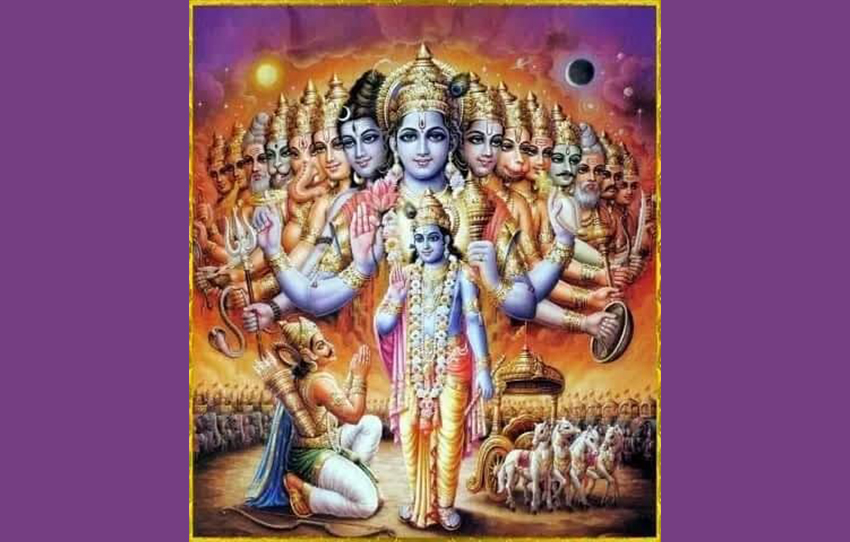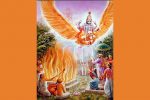NAME 2
Viṣṇuḥ विष्णुः
The previous nāma said that the Brahman is beyond comprehension. This nāma says Thy name is Viṣhṇu. The significance between the first two nāmas is the root word viṣ, which means all pervading power. Viṣhṇu is also known as Nārāyaṇa. Nārāyaṇa Sūktaṁ, which forms part of Mahānārāyaṇa Upaniṣad (XVIII.5) says, ‘antarbahiśca tatsarvaṁ vyāpya nārāyaṇaḥ sthitaḥ’, अन्तर्बहिश्च तत्सर्वं व्याप्य नारायणः स्थितः which means Nārāyaṇa pervades both internally and externally, indicating His omnipresence. He pervades as both internal Spirit and external objects. But, how does He help one in attaining liberation? Rig Veda (I.156.3) has an answer. It says, “asya jānanto nāma cidvivakta namahaste viṣṇosumatiṁ bhajāmahe, अस्य जानन्तो नाम चिद्विवक्त नमहस्ते विष्णोसुमतिं भजामहे” which means “O ye who wish to gain realization of the supreme truth, utter the name of Vishnu at least once in the steadfast faith that it will lead you to such realization.” It signifies that those who adore the splendour of Lord Viṣṇu attain spiritual upliftment.
२. ॐ विष्णुवै नमः
2. Om Vishnuhve Namah
Vishnu:
a) One who permeates everything, is inside every sentient and non-sentient being.
b) One who surrounds everything. He who is the most auspicious; He who is the god of gods; He who is the eternal father of all creatures is the one god The Supreme Purusha (person), the LORD VISHNU is the code of conduct superior to every other way of life.
INTERPRETATION GUIDED BY SANT VANI (WORDS OF SAINTS)
Viṣṇuḥ (also names 258,657)
The one who pervades everything.
In one’s dream, all the animate as well as inanimate objects – water, mountains, trees, stones, furniture, and people – all of them without exception are pervaded by the intelligence of the dreamer. The material for the dream has also come from the dreamer and not from outside himself.
As the material cause and the intelligent cause the Lord pervades everything. Try and think of one object, one situation, one person, one emotion which the Lord does not pervade.
The word Viṣhṇu as derived from the verbal root ‘viṣ’ means one who pervades, permeates everything and is free from the limitations of time, space and objects. The Mahānārāyaṇopaniṣad says, ‘antar-bahiśca tat sarvam vyāpya nārāyaṇaḥ sthitaḥ–it is Lord Nārāyaṇa, who stands inside and outside, pervading everything. As derived from the verbal root ‘viś,’ it means one, who has entered this world.
The Viṣhṇu-purāṇa says, the root ‘viś’ has the meaning of entry. Since the entire jagat is entered into and pervaded by His śakti, law and order, He is well known as Viṣhṇu.
The first name VIṤVAM spoke of he who is the “Universal-All”. When the question is asked as to WHO is that who represents this Universal-All, the answer is VISHNU.
Derived from the root Viṥ, it refers to someone who is present everywhere and he who has entered/penetrated into everything:
“Yasmat vistam idam sarva tasya saktya mahatmanah, tasmad evo’cyate Viṣnur dãtoh praveśanat”
The Shakthi of that supreme personality VISHNU has entered into the VIṤVAM.
Expressed as Veveṣti – he is the one who has enveloped everything there is, embraced as it were all that we see and know – limitless and unlimited by Desha (Space), Kala (Time) and Vastu (objects).
“Vevesti Vyapnoti iti Vishnu”
He who’s nature is all pervading and who envelops all, he is Vishnu. Therefore the VIṤVAM is VISHNU.
“Antar-bahishca Tat Sarvam Vyapya Narayana Stitaha” (Narayana Suktam/Upanishad)
“Naryana stands pervading and interpenetrating the entire cosmos – both within and without.”
“I am Vishnu because I measured the sky and the earth (as Vamana) and as I have pervaded Universe and extend even beyond it” (Mahabharata). As VIṤVAM he is the Universal-all and as Vishnu he is “he who is everywhere”.
There is this story of Andal which sums up this principle of all pervasiveness.
Andal spent a night at a devotee’s house. When the lady of the house came to wake her up, she found Andal sleeping with her feet pointing to the East or perhaps facing the puja room. She was shocked, but Andal only replied thus “If I sleep with my feet facing East, he is of course there but if I sleep with my feet facing North or South is he not there? Shall I sleep standing on my head? But won’t my feet still be pointing towards him? Tell me what direction shall I point my feet in?
This is not to say that we must no follow the basic principles but just to illustrate the point of how “Vishnu” the name refers to “him who is everywhere…”
To put the pervasiveness of Vishnu in perspective – The earth is a speck in one of the distant outskirts of our galaxy called the Milky Way. The star that sustains us and the billion stars that populate this stretch are spread across a hundred thousand light years. If we were somehow to reach the edge of this galaxy and peer over the edge into the infinity of never-ending space, VISHNU would still be there and stretching even beyond…
Such is the nature of the person who is everywhere.
“Asya Jananto Nama Cidvivaktana, Mahaste Viṣno Sumatim Bhajamahe” (Rig Veda)
Adi Shankara remarks that for attainment of correct jnana, nama sankirtana, chanting of names of Vishnu is ordained. The cycle of birth and death can be broken by chanting the name VISHNU.
ॐ नारायणाय विद्महे। वासुदेवाय धीमहि। तन्नो विष्णु प्रचोदयात्।।
Please watch from 28.08min to 28.48min



